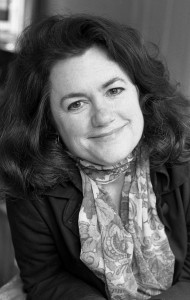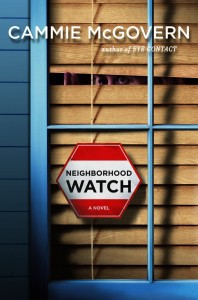October 28th, 2010
As Others See Us — An Author On Why She Loves Librarians
At the October Librarians Sneak Peek Book Preview 2011 in New York, author Cammie McGovern gave the following keynote.

Libraries are, for many of us, the public places where we bring our most private selves; Cammie McGovern -- Photo -- Ellen Augarten
The narrator of my book, Neighborhood Watch (Viking, June, 2010) is a librarian who has been falsely convicted of murdering her neighbor and has spent twelve years in prison. “Why a librarian?” people have asked, a little aghast, as if to say: surely any other career would make her a more plausible murderess.
No, I’ve had to say, I made her a librarian for many reasons: In part, because I wanted this character to be accommodating and thoughtful. Her conviction rests in large part on a confession the police extracted in which she told them she didn’t remember what happened, but could imagine what had.
I knew a librarian would have that sort of imagination. She’d have a sense of compassion, along with a sense of responsibility. She’d say to herself, I might have done it, and I don’t want someone else to be blamed. Indeed, I made the choice for many reasons, but the main one might also be the simplest: I love libraries. I always have in ways that go so deep and seem so private it’s actually hard for me to write about them.
Libraries are, for many of us, the public places where we bring our most private selves, our fears and our dreams, so long buried and so studiously unspoken. The librarian checking out a stack of books may be for many of us, the equivalent of the first person we’ve told a secret to. Which brings me to the real reason I chose the profession that I did for my narrator: Even more than libraries, I love librarians. Not that I know many particularly well. In fact, considering the amount of time I spend in my public library, the surprise is that I’m on a first name basis with exactly one. Or maybe it’s not a surprise.
In general, I don’t think of myself as a shy person except about things that matter most to me and then I become surprisingly tongue-tied. I remember when my son was first diagnosed with autism and the week I spent afterward, visiting and not checking out the books in the library that would help me understand what we were up against. I was fairly new in town and knew none of the librarians then. The closest I’d come to a conversation with any of them was the patient way one librarian in the children’s room allowed my son to crawl behind her desk to see where all her electrical outlets were. “So smart!” she said when he found them. At that point, I had no diagnosis. I was terrified of the countless ways my toddler didn’t seem like other toddlers around him. I was still grasping at straws and clinging to tiny life rafts of hope. “There!” I thought. “The librarian thinks he’s smart!” A few months later, I didn’t want to check out the books I really needed because I didn’t want that librarian to know that same brain she had politely applauded had a different label now.
When I finally did—when the books and the information they contained were more important than what the librarian might think—Guess what? She said nothing. I suspect there might be a class in this for librarians. The essential point being: Make no comments on books being check out. Even seemingly innocent remarks like “Good luck!” with a pile of diet books or “Taking a trip?” when a patron has a stack of travelogues. She was meant to say nothing and she did that.
But she knew. She knew what I hadn’t had the courage to tell many friends, neighbors, even some family members.
She also knew when I had so much trouble finding a teaching job that I stood in line with a stack of HOW TO PUBLISH MAGAZINE ARTICLES AND GET PAID! books. Admitting you want to write for slick magazines before you’ve ever been published in one is, for many of us, acutely difficult and embarrassing. The very idea seems full of hubris and self-delusion, like signing up for a beauty pageant when you may or may not be pretty, someone else will decide. The whole business feels harrowing and awful. How could I hand those books over and not think of Yeats: “But I being poor, have only my dreams; I have spread my dreams under your feet; Tread softly because you tread on my dreams.”
I wrote about a librarian because I have been watching and admiring librarians from a distance for the better part of my working adult life. I now speak as one of your countless patrons, grateful for the silent exchanges we have had. When you’ve smiled and praised a toddler for crawling under desk; when you’ve lent me books that speak volumes to a struggle I am having and said nothing at all; and again, when you’ve touched one cellophane cover in a stack and said, “I love this one. I think it’s her best.” Books are such a private pleasure we who write them sometimes have trouble sharing that pleasure. Book clubs are wonderful and slightly awkward as well. Every one that I visit as a writer I want to join as a participant so we can all be on the same level and say what we honestly think. Then again, if we sit around and talk all day about books, we’ll never get any written or read.
Librarians seem to understand this. Perhaps even better than my dear husband who always interrupts my work saying he hates to interrupt but he has just one quick thing to tell me. Librarians have their own jobs to do and seem to respect that even the craziest-seeming people have come to the library with some purpose in mind and deserve that respect and an environment free from cell phones. We must all get on with it, whatever we’ve come to the library to do.
How can we thank you collectively for all that you’ve done? It would be, for some of us, like trying to thank our parents for a life that contains many periods of quiet happiness. You give us all a place to come and be ourselves for hours at a time. You don’t judge our quirks or the number of hold requests we fill out every month. You honor our questions even when they are as random as the recent one my autistic son, who is now fourteen, asked the librarian who’d once praised his electrical skills. “Do you have any books about orange things?” he apparently asked. I wasn’t listening, I was busy with one of my other sons, but no doubt he was nervous, and not sure how to say what he was looking for. I wasn’t there to help her interpret. I only turned around and saw him about ten minute later grinning wildly with exactly what he wanted: an armful of picture books about pumpkins.
Thank you for giving us all what we need, even when we don’t have the words to say exactly what we’re looking for.

